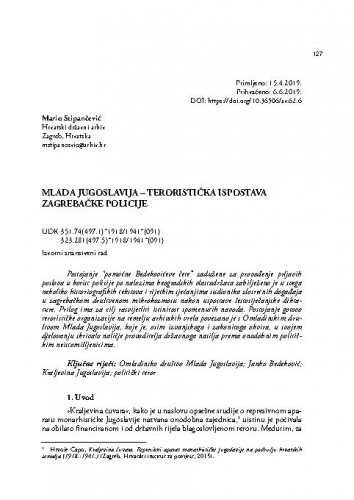Postojanje “pomoćne Bedekovićeve čete” zadužene za provođenje prljavih poslova u korist policije po nalozima beogradskih vlastodržaca zabilježeno je u svega nekoliko historiografskih tekstova i rijetkim sjećanjima sudionika zlosretnih događaja u zagrebačkom društvenom mikrokozmosu nakon uspostave šestosiječanjske diktature. Prilog ima za cilj rasvijetliti istinitost spomenutih navoda. Postojanje gotovo terorističke organizacije na temelju arhivskih vrela povezano je s Omladinskim društvom Mlada Jugoslavija, koje je, osim izvanjskoga i zakonitoga okvira, u svojem djelovanju skrivalo naličje provoditelja državnoga nasilja prema onodobnim političkim neistomišljenicima.; A certain youth society established as a police cover-up organization for carrying out acts of spying, extortion, threats, intimidation and murder of political opponents of the Yugoslav power-holders in the 1930s was rarely mentioned in historiographical texts. The components of its existence were almost completely blurred in these works, from its name, structure, membership, ideology, to its aims and actions. The article tried to overcome this by shedding light on the personality of the former director of Zagreb’s police and King Alexander’s favourite, dr. Janko Bedeković, revealing him as the initiator and the direct financier of ‘The Young Yugoslavia’ youth society – the association that under the usual guise of the state-spread organization whose intention was to promote the Yugoslav idea among the youth hid the grimy side of carrying out direct police orders in dealing with political opponents. The terror carried out by the members of ‘The Young Yugoslavia’, just like the period of Bedeković’s tenure as the head of Zagreb’s police, remained deeply rooted into the collective memory of the Croatian society of that time. The extorted criminals, bullies and swindlers protected by the membership card of that society had, under the guise of the Yugoslav idea and the fight for a unified national state, free hands to satiate their personal and morally questionable urges. This is perhaps the first occasion that their mention is based on archival sources.
Sažetak

 Arhivski vjesnik : 62(2019) / glavna i odgovorna urednica, editor-in-chief Rajka Bućin.
Arhivski vjesnik : 62(2019) / glavna i odgovorna urednica, editor-in-chief Rajka Bućin.